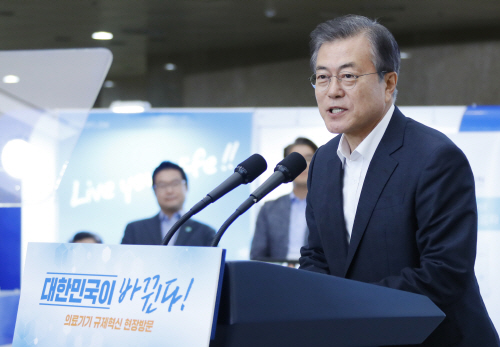 |
| President Moon Jae-in announces the government's plan to remove excessive and unnecessary regulations on medical devices at Seoul National University Bundang Hospital (SNUBH) in Gyeonggi on Thursday./ Source: Yonhap News |
AsiaToday reporter Kim Si-young
The South Korean government will be speeding up its reform on medical device regulations. The rapid introduction of advanced medical devices is expected to further strengthen the people's right to health and enhance the competitiveness of the domestic medical device industry. Besides, establishing an industrial-hospital cooperation agency will be allowed in research-oriented hospitals in order to secure a bridgehead for cooperation among industries, hospitals, and institutes.
The government announced its plan for medical equipment deregulations for the expansion of innovative growth in a meeting at Seoul National University Bundang Hospital (SNUBH) on Thursday, with President Moon Jae-in's attendance.
"We need to be able to use the innovative technology we possess in saving and treating the people in the medical field," President Moon Jae-in said. "In the case of medical equipment whose safety has been proven, there is a need to lower the wall of regulations to allow such equipment to more quickly enter the market and be used," he added.
As a result, regulations for medical devices and technologies with less safety concerns will be greatly relaxed by allowing them to enter the market first before being evaluated. In particular, the evaluation of new medical technology in the field of vitro diagnostic tests will be shifted from pre-evaluation to post-evaluation, and the time required for vitro diagnostic tests to enter the market will be greatly shortened to 80 days from the current 390 days.
For future promising medical technologies, whose safety has been proven, will be allowed to enter the market first. Then they will undergo three to five years of clinical usage period before undergoing a reevaluation.
In addition to regulatory reform, the government plans to foster the medical device industry.
It will allow the establishment of "industrial-hospital cooperation agency" in research-oriented hospitals to lay the foundations for the hospitals to become innovative medical technology research and commercialization hubs. The government also decided to promote policies that foster research physicians who can lead the development of innovative medical devices, and support performance improvement of domestic medical devices while enacting the Medical Device Industry Promotion Act.
The government's decision is based on the belief that institutional support has not been achieved despite the need to nurture innovative and cutting-edge medical device industry as a futuristic new industry in the fourth industrial revolution era.
#medical equipment #regulatory reform #deregulation #medical devices
Copyright by Asiatoday
Most Read
-
1
-
2
-
3
-
4
-
5
-
6
-
7





















